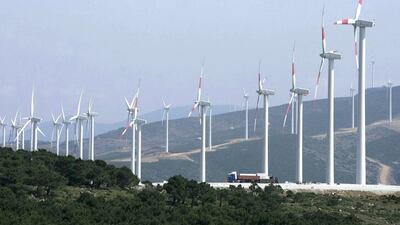Abu Dhabi clean energy company Masdar expects a "sizeable part" of its renewable energy growth over the next five years to come from South-East Asia and Central Asia as it plans new projects to double capacity.
The company will look to develop new projects in Malaysia, Vietnam, Indonesia and Taiwan. It is bullish about new opportunities in Uzbekistan, Kazakhstan, Azerbaijan and Armenia.
“Masdar is now a global energy developer and we have an ambitious plan to grow our business further,” said Fawaz Al Muharrami, acting executive director of clean energy at Masdar.
“South-East Asia is an interesting market, and the growth of their economies is high and they have also started focusing on renewable energy targets,” he said.
“They are becoming active in that field and facilitating [a] proper regulatory environment to embody the development of renewable energy projects. We think that there is a good opportunity for us to benefit from this environment and grow further.”
Earlier this month, Masdar signed an agreement with Malaysia’s Petronas to explore renewable energy opportunities in Asia with a focus on Taiwan, Vietnam and Malaysia.
It also invested $100 million in Indonesia last year to develop the country’s first floating solar photovoltaic plant. The 145-megawatt project is being developed in the Cirata reservoir in West Java.
In Central Asia, the company is “extremely active” and is participating in a number of bidding opportunities in Uzbekistan and other countries, said Mr Al Muharrami.
The company is building two clean energy projects in Uzbekistan – a 500MW utility-scale wind project and a $100m 100MW solar plant in the Zarafshon district of the Navoi region.
Last month, the company also signed a memorandum of understanding with Samruk-Kazyna, Kazakhstan's sovereign wealth fund, to develop a 1-gigawatt renewable energy project and is "also discussing with some other countries as well".
Masdar, which is owned by Mubadala Investment Company, currently operates in more than 30 countries with a total investment of about $19.9 billion.
The Masdar City-based clean energy company aims to double its renewable energy capacity in the next five years from the current 10.7 gigawatts.
The company is also evaluating new investment opportunities in Israel following the normalisation of relations between the country and the UAE last year.
It signed an agreement with France’s EDF Renewables in January to “collaborate on existing renewable energy projects and projects under development, while also exploring joint participation in new programmes announced by the government of Israel”.
Israel wants to generate 30 per cent of its energy from renewable sources by 2030, up from a previous target of 17 per cent, as it phases out the use of coal.
“We are really working very closely with them [EDF Renewables] to try and build that platform to buy some of those projects in Israel. Already, some of them are in operation and some of them are under construction.”
In Saudi Arabia, Masdar is developing the 400MW Dumat Al Jandal wind project and 300MW Jeddah solar plant.
“We will continue to be active in Saudi Arabia and it is an important strategic market for us,” said Mr Al Muharrami.
Saudi Arabia is pursuing an ambitious renewable power strategy and plans to add 60 gigawatts of clean energy capacity to the national grid by 2030.
Meanwhile, construction on the 2-gigawatt Al Dhafra solar plant in Abu Dhabi, which will be the biggest in the world when completed, has started and is “going to take a year and a half or so until the project is complete”.
The project is being developed by EDF Renewables, China's JinkoPower and Abu Dhabi National Energy Company, or Taqa.
The plant is expected to become fully operational in 2022 and will generate enough electricity for about 160,000 homes across the UAE.


